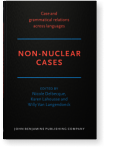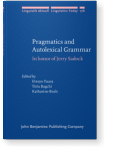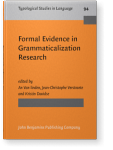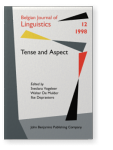Hans Smessaert
List of John Benjamins publications for which Hans Smessaert plays a role.
2014 Adpositional constructions of location and motion in Dutch Non-Nuclear Cases, Delbecque, Nicole, Karen Lahousse and Willy Van Langendonck (eds.), pp. 127–172 | Article
In traditional grammar, constructions of location and motion are standardly considered as adverbial adjuncts, i.e. as constituents that do not belong to the nuclear or core elements of the clause. However, in Dutch, as in many other languages, there are different classes of verbal predicates which… read more
2011 Wait’ll (you hear) the next one: A case for an enclitic preposition and complementizer Pragmatics and Autolexical Grammar: In honor of Jerry Sadock, Yuasa, Etsuyo, Tista Bagchi and Katharine Beals (eds.), pp. 175–192 | Article
In English both the preposition and complementizer till take on the enclitic form ‘ll, with the main verb wait serving as its host. This chapter offers a multimodular analysis of these enclitics within the Autolexical/Automodular framework of Sadock (1991, 2003). Although they are bound morphemes… read more
2010 From manner expression to attitudinal discourse marker: The case of Dutch anders Formal Evidence in Grammaticalization Research, Van linden, An, Jean-Christophe Verstraete and Kristin Davidse (eds.), pp. 137–190 | Article
In this study, we distinguish between three major subtypes of the Dutch adverb anders in terms of the concepts of comparison and phoricity. The criteria of proportionality, clefting and the interaction with negation are applicable to [+comparative/+phoric] Type I anders but not to… read more
1998 Adverbials of Aspectual Focus and Negation in Dutch Tense and Aspect: The contextual processing of semantic indeterminacy, Vogeleer, Svetlana, Walter De Mulder and Ilse Depraetere (eds.), pp. 61–75 | Article
Abstract. In this paper two paradigms of four Dutch adverbials are discussed, the first consisting of al ('already'), al niet meer ('already no longer'), nog altijd ('still always'), and nog altijd niet ('still always not'), the second of eindelijk ('finally'), eindelijk niet meer ('finally no… read more



